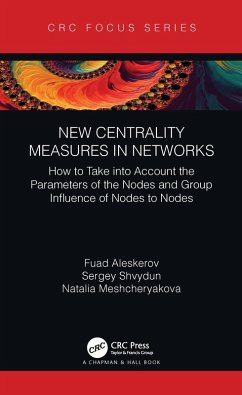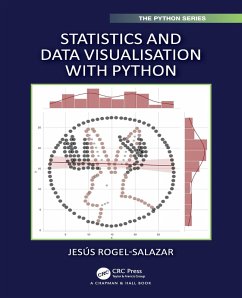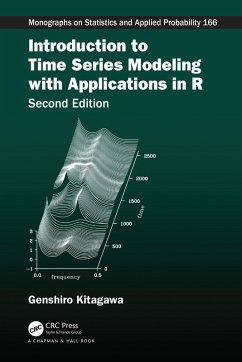
New Centrality Measures in Networks (eBook, ePUB)
How to Take into Account the Parameters of the Nodes and Group Influence of Nodes to Nodes

PAYBACK Punkte
11 °P sammeln!
Over the last number of years there has been a growing interest in the analysis of complex networks which describe a wide range of real-world systems in nature and society. Identification of the central elements in such networks is one of the key research areas. Solutions to this problem are important for making strategic decisions and studying the behavior of dynamic processes, e.g. epidemic spread. The importance of nodes has been studied using various centrality measures. Generally, it should be considered that most real systems are not homogeneous: nodes may have individual attributes and ...
Over the last number of years there has been a growing interest in the analysis of complex networks which describe a wide range of real-world systems in nature and society. Identification of the central elements in such networks is one of the key research areas. Solutions to this problem are important for making strategic decisions and studying the behavior of dynamic processes, e.g. epidemic spread. The importance of nodes has been studied using various centrality measures. Generally, it should be considered that most real systems are not homogeneous: nodes may have individual attributes and influence each other in groups while connections between nodes may describe different types of relations. Thus, critical nodes detection is not a straightforward process.
New Centrality Measures in Networks presents a class of new centrality measures which take into account individual attributes of nodes, the possibility of group influence and long-range interactions and discusses all their new features. The book provides a wide range of applications of network analysis in several fields - financial networks, international migration, global trade, global food network, arms transfers, networks of terrorist groups, and networks of international journals in economics. Real-world studies of networks indicate that the proposed centrality measures can identify important nodes in different applications. Starting from the basic ideas, the development of the indices and their advantages compared to existing centrality measures are presented.
Features
New Centrality Measures in Networks presents a class of new centrality measures which take into account individual attributes of nodes, the possibility of group influence and long-range interactions and discusses all their new features. The book provides a wide range of applications of network analysis in several fields - financial networks, international migration, global trade, global food network, arms transfers, networks of terrorist groups, and networks of international journals in economics. Real-world studies of networks indicate that the proposed centrality measures can identify important nodes in different applications. Starting from the basic ideas, the development of the indices and their advantages compared to existing centrality measures are presented.
Features
- Built around real-world case studies in a variety of different areas (finance, migration, trade, etc.)
- Suitable for students and professional researchers with an interest in complex network analysis
- Paired with a software package for readers who wish to apply the proposed models of centrality (in Python) available at https://github.com/SergSHV/slric.
Dieser Download kann aus rechtlichen Gründen nur mit Rechnungsadresse in A, B, BG, CY, CZ, D, DK, EW, E, FIN, F, GR, HR, H, IRL, I, LT, L, LR, M, NL, PL, P, R, S, SLO, SK ausgeliefert werden.













